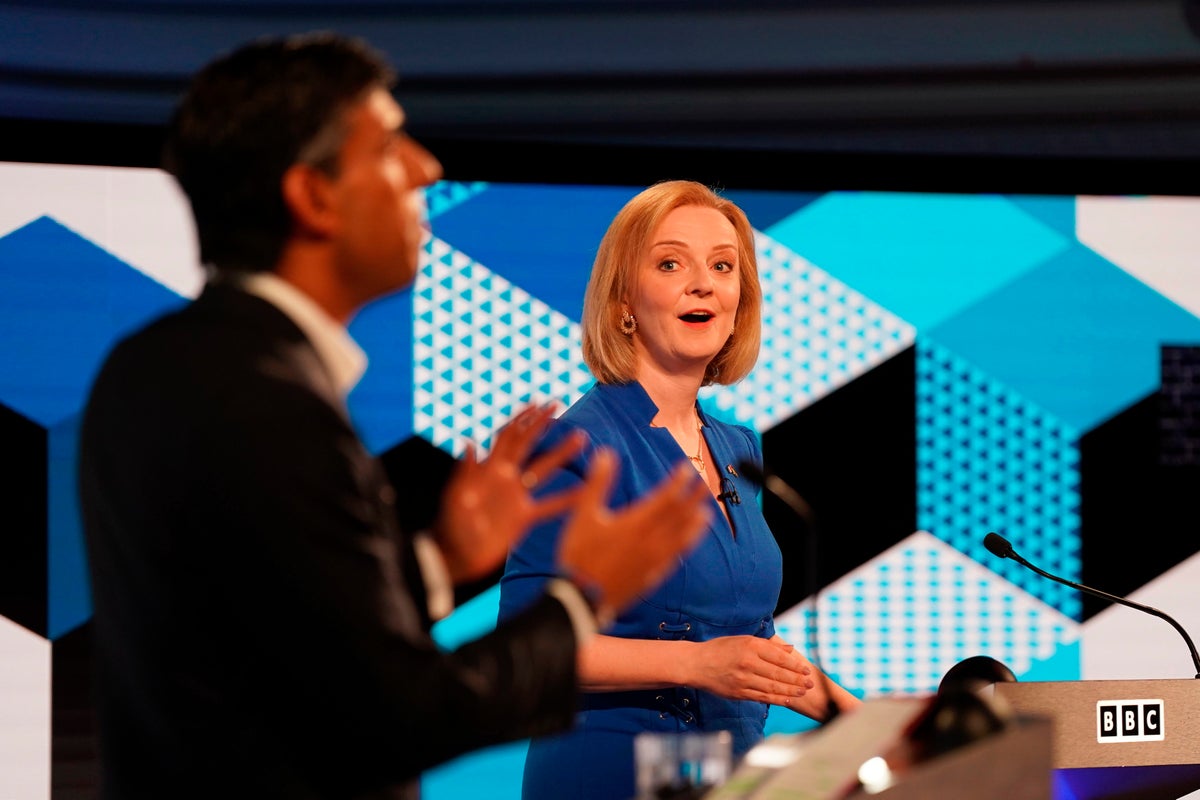
Britain’s next prime minister will take office amid turmoil: galloping inflation, a war in Ukraine, souring relations with China, a changing climate.
But not all those issues are getting equal attention as Foreign Secretary Liz Truss and former Treasury chief Rishi Sunak vie for the votes of about 180,000 Conservative Party members. One of them will be elected Sept. 5 to replace the scandal-tarnished Boris Johnson, who stepped down as party leader this month.
Here is where the candidates stand on key issues:
ECONOMY
With Britain facing its tightest cost-of-living squeeze for decades amid soaring energy prices and 9.4% inflation, the economy has unsurprisingly dominated the contest — and it’s here where the two candidates differ most.
Truss is promising immediate tax cuts, saying she will scrap a 1.25% income tax hike introduced by Sunak to help fund the nation's health and social care, and will cancel a planned corporation tax rise. She says she’ll fund the cuts through borrowing.
Sunak says he would get inflation under control before trimming taxes, although, facing pressure from polls showing Truss is ahead in the race, he has pledged to scrap the sales tax on domestic energy bills for a year.
Both claim the moral high ground. Truss says hiking taxes amid a cost-of-living crisis is “morally wrong,” while Sunak says “it’s not moral” to pass bills on to future generations.
The Institute for Fiscal Studies, an independent think-tank, notes that “the candidates have been less forthcoming about their intentions for public spending.” They have made little mention of Johnson’s repeated promises to channel investment into deprived areas of central and northern England that lag behind the wealthier south. The IFS said Truss’s plans were likely to bring austerity, because “in the end lower taxes do mean lower spending.”
IMMIGRATION
Both candidates have doubled down on the Johnson government’s controversial plan to send some asylum-seekers arriving in the U.K. on a one-way trip to Rwanda.
Under an agreement between the two countries, the migrants will be considered for asylum in the East African nation, rather than the U.K. The British government says the policy will deter people-trafficking gangs who ferry people across the English Channel, but human rights groups say it's immoral, illegal and a waste of taxpayers’ money.
The cross-party House of Commons Home Affairs Committee concluded that “the asylum agreement with Rwanda so far shows no evidence of being the deterrent it is intended to be.” Small boats keep crossing the Channel, no one has yet been sent to Rwanda, and the policy is being challenged in the British courts.
Nonetheless, Truss has suggested she could expand the program to other countries. Sunak says he will keep the Rwanda policy and might cap the number of refugees admitted to the U.K. each year.
BREXIT
When Britain voted on whether to leave the European Union in 2016, Sunak and Truss were on opposite sides. Sunak was a “leave” supporter, while Truss argued that the U.K. should remain in the bloc.
Now that Britain has left, both are keen champions of Brexit. They say they will seize the economic opportunities provided by Brexit — but have not given much detail about what those are. Both deny that Brexit was responsible for the hours-long delays faced by travelers and truckers at the port of Dover last week, though many economists say new barriers to trade and travel are clearly a factor.
Truss and Sunak both will push on with a plan to rip up parts of the U.K.-EU Brexit treaty governing trade with Northern Ireland, a move that has triggered legal action by the EU and could escalate to a trade war.
Many Conservatives see Sunak as softer on the issue, because as Treasury chief he was concerned about the potential damage to Britain’s economy. The less emollient Truss has the support of hardline Conservative Brexiteers, despite her past as a “remainer.”
CLIMATE CHANGE
Both candidates promise to meet the British government’s target of reaching net zero carbon emissions by 2050, but green issues have featured little in the campaign.
Sunak has talked of using technology and of building more offshore wind farms. Truss says she will remove a “green levy” on energy bills that is used to fund renewable energy projects, something critics say will slow progress toward net zero.
Greenpeace and other environmental groups have railed against the lack of focus on energy and climate issues in the campaign, especially as Britain this month experienced 40 degrees Celsius (104 degrees Fahrenheit) for the first time.
RUSSIA AND CHINA
Both candidates say they will continue the staunch support for Ukraine that has made Johnson more popular in Kyiv than in London. Britain has given Ukraine 4 billion pounds ($5 billion) in military and humanitarian aid to help it fight Russia’s invasion and is training Ukrainian troops on U.K. soil.
Sunak and Truss promise there will be no lessening of Britain’s support if they take over, and both say they will keep defense spending above the 2% of GDP recommended by NATO. Truss has pledged to go farther and raise it to 3% by 2030.
Both also are hawkish on China, though Truss’s criticism is louder. As foreign secretary she has called for a “network of liberty” to counter China’s growing political and economic influence, and she opposes Chinese investment in U.K. infrastructure projects like nuclear power plants.
As finance minister, Sunak’s past comments on China stressed the importance of maintaining a productive economic relationship. He has hardened his tone, calling China the “biggest-long term threat to Britain.” He says that if elected he will close the 30 Beijing-funded Confucius Institutes in Britain.
Beijing is unimpressed by both candidates’ rhetoric. Chinese Foreign Ministry spokesman Zhao Lijian this week urged British politicians not to “hype the so-called China threat.”
“Such irresponsible remarks will not help solve their own problems,” he said.







